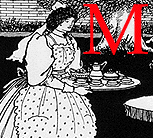 r Best's thesis is that the young woman is mortally
ill and the narrator kills her to end her suffering. Porphyria is the name of a rare disease, of course,
which might substantiate the idea, if Browning knew
of this meaning. Yet here is an alternative reading.
r Best's thesis is that the young woman is mortally
ill and the narrator kills her to end her suffering. Porphyria is the name of a rare disease, of course,
which might substantiate the idea, if Browning knew
of this meaning. Yet here is an alternative reading.
The young woman and the narrator are both of the so-called gentle classes — that is, a lady and a gentleman. Their speech suggests this, to begin with (though I'm not sure if Browning ever tried to imitate lower class speech?) Her hair seems to be clean, something not generally associated with Victorian lower class girls (no fault of their own, just no facilities.)
They meet in a cottage which suggests something is wrong with the man; seemingly they can't meet openly or socially. If he were severely mentally ill, the chances are he'd be cared for by his family — either in an institution or, if they had a big enough house, in rooms at home. He is therefore more likely to be a gentleman who has gone to the bad. He certainly seems to be shiftless: sitting in a cold cottage without lighting a fire.
Sons of the gentry who went wrong most usually became remittance men, packed off overseas (often to the colonies) and paid a regular allowance as long as they stayed out of England. Somerset Maugham has a story about one such man in the Dutch East Indies. A man who'd gone off the rails might also join the Army, in the ranks. Kipling's "gentlemen-rankers out on a spree" are examples. Kipling tells us the troopers sometimes called them 'sir' out of a habit of deference to men of higher class who would be instantly recognised through accent, vocabulary, and general body language [www.daypoems.net/poems/1803.html] (One even became a navvy, cut off forever from his home.)
Mr Best suggests the young woman is pale because of illness, but the line isn't end-stopped and it runs on:
Nor could tonight's gay feast restrain
A sudden thought of one so pale
For love of her.
This suggests there was a rival suitor, surely? But suddenly the narrator realises he is the only one the woman loves. He is pretty unlovable, shunned by his own family, and has perhaps never been loved before. For the first time a woman loves him and, not only that, she also prefers him to another man who wants her. What can he do with such knowledge: how can he keep her?
To keep her, he kills her. Now he will possess her forever where alone it matters: in his mind.
And the dead woman, he believes, is now contented too: the man she scorned is gone and she has the man she loves. That was her only wish, he tells himself, though she never guessed in what way it would be fulfilled.
God doesn't seem to object either, is perhaps the meaning of the last line. Or, again, there is no God to care might be more in keeping with the man's character.
On the other hand, Occam's Razor might suggest that the poem is a parable about the human capacity for evil, how we casually and wantonly destroy things of great value for no real reason. The narrator is not in his right mind, but he represents undiluted wickedness rather than sickness.
Related Materials
- Interpreting "Porphyria's Lover" — A Case study in what counts as evidence and where the ambiguities arise in dramatic monologues?
- Scott Mcloudd's line-by-line visual interpretation
Last modified 18 April 2006